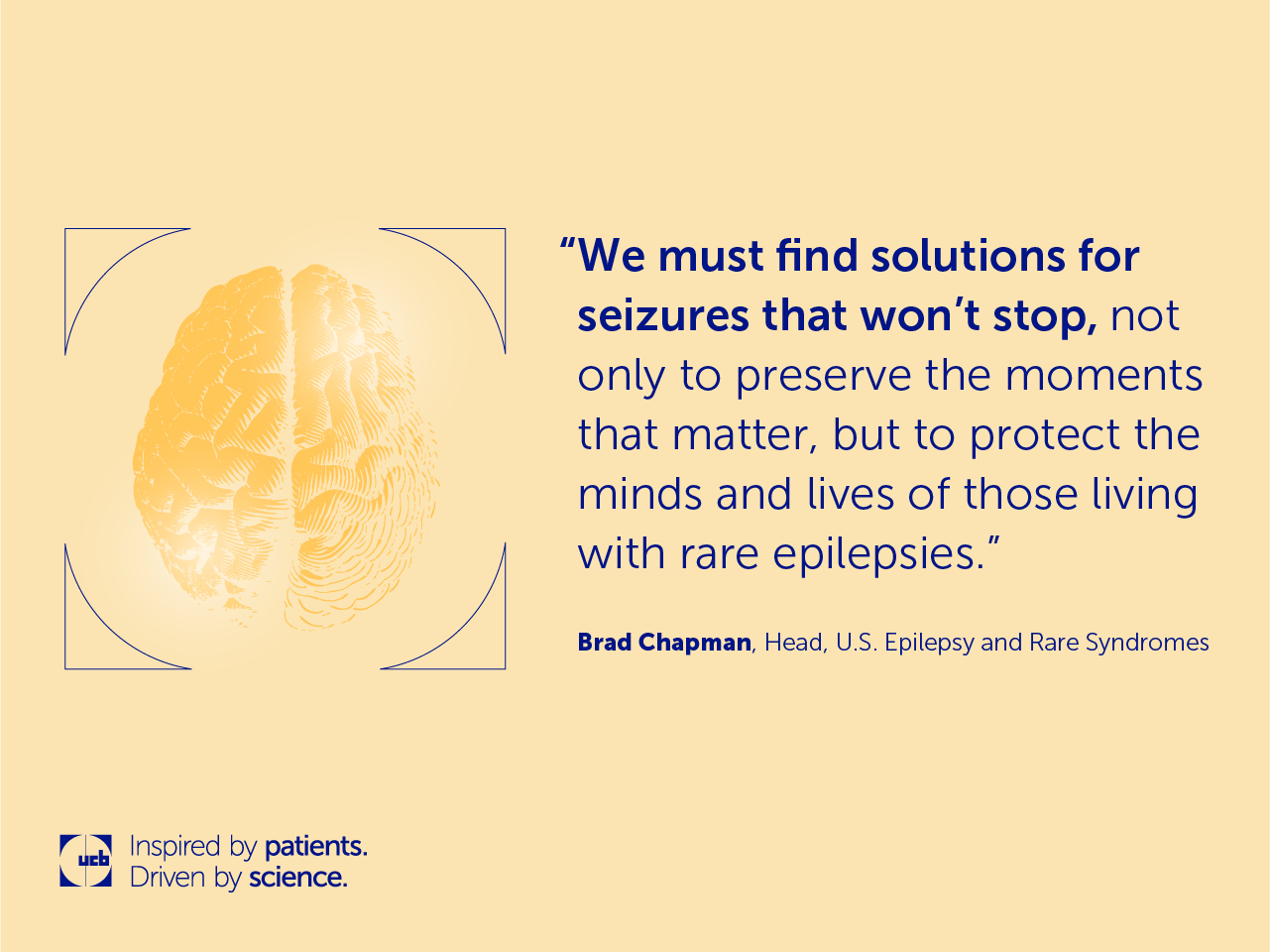
For over thirty years, UCB has remained dedicated to improving the lives of people living with epilepsy and rare syndromes, as well as their caregivers. Our commitment extends beyond developing treatments for seizures; we strive to understand patients’ and their families’ ups and downs - through every step of their journey. From diagnosis to treatment and support, we aim to be there for those vulnerable moments, providing solutions that preserve the quality of life for those affected.
At the core of our purpose are patients and their families. This commitment has driven us to the forefront of epilepsy research, development, and treatment innovation. Thirty years ago, we ushered in a new era of epilepsy therapies largely due to our scientific breakthrough, introducing a completely unique and novel mechanism of action in the treatment of epilepsy, and we continue to redefine treatment possibilities. Through acquisitions, we’ve accelerated our focus on addressing the needs of rare populations, providing solutions for those living with Dravet syndrome (DS) and Lennox-Gastaut syndrome (LGS). UCB has an indisputable legacy in epilepsy, with a commitment to continue expanding our portfolio of medicines for epilepsy, rare epilepsy syndromes and seizure rescue. In addition to solutions for people living with DS and LGS, our current portfolio includes treatment options for multiple seizure types inclusive of partial-onset seizures, generalized tonic-clonic, and seizure clusters. Our personalized care approach addresses specific unmet needs, driven by our mission to disrupt disease and improve quality of life.
Our work isn't only about delivering therapeutic solutions to those whose health will benefit from them. It extends to empowering people through support offerings, advocacy, access and affordability programs, education, community support and advances in technology. By actively seeking out collaborations with strategic partners, we are able to deliver on our mission to provide long-term value to patients and their families as well as their larger care teams. Our impact and leadership includes:
-
The annual UCB Family Epilepsy Scholarship ProgramTM, established in 2004, which has awarded over $3 million in scholarships to more than 600 recipients, supporting their educational pursuits.
-
Collaborations with institutions such as Le Bonheur Children's Hospital, the Wisconsin Health Information Organization (WHIO), and Yale University to examine the impact of seizure clusters on patient and caregiver quality of life, leveraging the power of education and real-world evidence (RWE) to address this research gap, expand awareness, and enact positive change in the health outcomes of individuals with seizure clusters.
-
We work with more than 20 organizations committed to this community such as American Epilepsy Society, Danny Did Foundation, the Epilepsy Foundation, and Child Neurology Foundation (CNF) to support the creation of a toolkit of resources to raise awareness of potential causes of SUDEP.
-
Sponsorship of programs like Epilepsy Advocate™ and Exploring Epilepsy Today to provide resources and connections for patients, caregivers, and healthcare professionals.
-
For nearly three decades – almost since its inception – we have partnered with Canine Assistants – knowing the value these incredible dogs bring to those living with seizures. In February, new research was published in "Neurology," the medical journal of the American Academy of Neurology, suggesting that for people who live with drug-resistant epilepsy, having a dog trained in detecting seizures and other epilepsy-related tasks may reduce seizure frequency, increase the number of seizure-free days, and improve quality of life.1 These encouraging findings reiterate why we actively and strategically seek collaborations that provide long-term value to those living with epilepsy and their families.
At UCB, we also continuously seek to innovate for the future creating our Digital Care Transformation incubator. Through this initiative, we support healthcare startups developing innovative solutions for epilepsy, such as NeuroHelp and Epihunter, using AI and wearable technology. We have also invested in detection and monitoring device companies like Neurava, Nextsense, Eysz, and Byteflies who are developing advanced technologies to improve seizure detection and monitoring, elevating the standard of care.
For the past three decades, we've been passionately serving this community. But our past breakthroughs are only a prologue to our future. We will continue to reimage how we care for patients, leveraging today's expertise for a better tomorrow. With so much experience behind us and so much potential ahead, we are more invested than ever in profoundly improving the lives of those living with or caring for those with epilepsy or a rare epilepsy syndrome.
Reference
- van Hezik-Wester, V., de Groot, S., Kanters, T., Wagner, L., Ardesch, J., Brouwer, W., Ramos, I. C., le Cessie, S., Versteegh, M., & van Exel, J. (2024). Effectiveness of Seizure Dogs for People With Severe Refractory Epilepsy: 1Results From the EPISODE Study. Neurology, 102(6). https://doi.org/10.1212/WNL.0000000000209178
©2024 UCB, Inc., Smyrna, GA 30080. All rights reserved. US-DA-240017
Choose Country
- Global Site – English
- Australia – English
- België – Engels
- Belgique – Anglais
- Brasil – Português
- България – Български
- Canada – English
- Canada – Français
- 中国 – 中文
- Česká Republika – Angličtina
- Danmark – Engelsk
- Deutschland – Deutsch
- France – Français
- España – Español
- Ελλάδα – Ελληνικά
- India – English
- Ireland – English
- Italia – Inglese
- 日本 – 日本語
- Казахстан – ағылшын тілі
- 한국 – 한국어
- Luxembourg – Anglais
- Luxemburg – Engels
- Magyarország – Angol
- México & Latinoamérica – Español
- Nederland – Engels
- New Zeeland – English
- Norge – Engelsk
- Österreich – Deutsch
- Polska – Polski
- Portugal – Inglês
- România – Engleză
- Россия – Русский
- Slovensko – Anglický
- Suomi – Englanti
- Sverige – Engelska
- Schweiz – Deutsch
- Suisse – Français
- Türkiye – Türkçe
- Україна – Англійська
- United Kingdom – English
- U.S.A. – English


